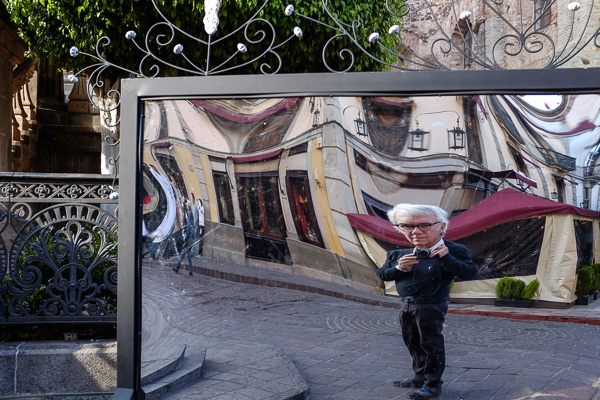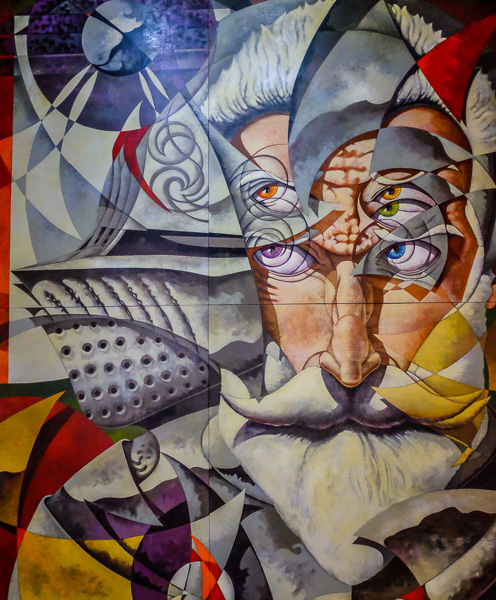I’ve been seeing various “Authors Recommend Books” columns lately, so thought I’d put in my ten cents worth. I’m constantly looking for books these days, ravenous for something to read, and to lose myself in, but over the decades I’ve become fairly picky. Also I’ve already read a lot of the books that I’d want to read…although rereading is a viable option. Anyway, here are some books that I liked this year, listed in on particular order, described in a rapid casual way, and separated by some of my Guanajuato photos. I know I’ve forgotten some books, and I might add more of them later on.

(1) Jonathan Franzen, Purity. 2015.
Franzen went to the same college as me, Swarthmore, but years later, also he lives in the Santa Cruz area a lot of the time. So there’s a natural affinity here. I’ve read all his novels—they’re page-turners with fine lit phrasing and rich, rounded characters who deal with issues somewhat out of the range of normal best-seller concerns. His books are for “us.”
The title, “Purity,” is of course off-putting, such an annoying word. But it turns out this is the first name saddled upon our main character by her mother, who is batshit crazy in a vintage-Santa-Cruz-California way. The scenes with Purity’s Mom set my teeth on edge, but they made me laugh too. A lot.
It’s a fat tome of a book, and ranges all over the place, and all of the places it goes are interesting. As a sidelight, Franzen puts in some of the best nature-writing since Kerouac, who also had a way of slipping in great visions of the physical world without any ceremony or hoo-haw. And the ending had me in tears.

(2) Arkady and Boris Strugatsky, Roadside Picnic. 1972.
This SF novel is legendary among cognoscenti, but somehow I’d never managed to get hold a copy. This year I got it in a new edition and devoured it.
When people tell me a book is great, I come into it with a certain amount of suspicion and resentment. But from the first page of Roadside Picnic I was fully on board. It has a transreal quality in that the characters are ordinary people suffering under a repressive government, just like the Strugatskys themselves. The sci-fi gimmicks are truly original and amazing. It’s very hard to invent things that feel so completely new. But yet it’s all very tactile and easy to understand. Lots of passionate by-play among the characters—they’re anything but cardboard cut-outs. And the ending broke my heart. I like big endings, I think it sucks if a book just tapers off. I need to find another Strugatsky book…

(3) Thomas Pynchon, Inherent Vice and Gravity’s Rainbow. 2009 and 1973.
My main man. His recent Inherent Vice is a lot of fun—kind of Raymond Chandler as stoner novel, with great dollops of paranoia and truly strange characters. It was a shame that this year’s movie version of Inherent Vice pretty much ate shit, with the pacing of most of the jokes getting stepped on. In any case I’d watch the movie again, although this time with the subtitles on, as in the film, the pinheaded Joaquin Phoenix “continues his campaign to convince movie goers they’re going deaf,” as one critic put it. Why, Joaquin?
What tends to happen when a new Pynchon book comes out is that I buy it in hardback, devour it, and then feel this salmon-like yen to return to the one true source, the rocky stream where my own writing style was born, the sacred strophes of Gravity’s Rainbow. I’ve read it five or six times by now, and each time I find new gems and savor the old ones. Forget Ulysses, GR was truly the greatest book of the twentieth century. You can learn everything you need to know about everything by reading it with deep inattention. Note that you pretty much won’t understand the book the first time through. You have to read it twice. Note also that it’s broken into little sections and, if you feel like it, you can just hop around and read the sections in random order. There’s a bunch of very short sections with titles, about 2/3 of the way through, I used to love to read those when I was high, and even now, not high, I love to read them, like the “Listening to the Toilet” section…you can think about that couple of pages for the rest of your life.

(4) Kim Stanley Robinson, 2312. 2013.
I don’t read all of Stan’s books—he can be a little too talky and didactic for my taste. Too straight. But 2312 is something else. It has the kind of loose, trippy style that appeals to me—the passages about looking at the sun from the planet Mercury are particularly zonkadelic. The idea is that, if you’re directly in the sun on Mercury you’re gonna be fried pretty soon, no matter how good a space suit you have. But if you get it right, you can walk along with the ever-east-to-west-moving “terminator,” that is the shadowy zone where the sun is just about rising, and spend hours or even days staring at the awesome streamers of old Sol. Highly psychedelic, and the toadlike character doing this is a cool guy. He’s not exactly an alien—he’s a gene-modded human. We’ve expanded out across the whole solar system, using hollowed-out asteroids for luxury liner ships, although some of the liners are, just for kicks, left empty and kept completely dark inside during a trip, and people grope around naked and get into some Mongolian clusterfuck situations. Stan narrates all this with heady aplomb.

(5) William Gibson, The Peripheral. 2014.
Bill started as the King of Cyberpunk, all those years ago, then went uptown and became hugely successful with engrossing lo-tech novels of intrigue and chicanery. But with The Peripheral he’s back in the house, rocking some true SF. He bases his action on kind of time-travel gimmick that manages to circumvent all of the vitiating and irritating paradoxes that come skulking in towards the fire whenever you set out to tell a time-related tall tale. Bill is from the sticks, down in Virginia, and he has a great touch for semi-redneck characters, baffled American detritus, and crazed yokels. He gets a lot of humor from his troupe without at any time being snobby or unkind. He’s one of them. And he always gets you to rooting for his people, it’s great. A stylistic trick I admire in The Peripheral is that he uses really short chapters, only a page or two long, piling up hundreds of them to fill out the book. I think he’s onto something in terms of fitting his product to the new American attentions span. A frikkin’ masterpiece.

(6) Douglas Coupland, All Families are Psychotic. 2001.
Two summers ago I was in Vancouver, Canada, and I wanted to catch up with Bill Gibson, but he was busy finishing The Peripheral as it happens, He directed me to a huge art show by the author Douglas Coupland at the main art museum in Vancouver. I enjoyed the show a lot—over the years I’d kind of stopped thinking of Coupland as someone I liked to read, I had this idea that in his more recent books he was repeating himself. But the show really did rock, so I rooted around and found an earlier book of his to read, and came up with this 2001 offering, All Families are Psychotic.
I found this to be one of Coupland greatest novels. He’s just so harsh, and in your face, and relentlessly bad-attitude. No joke too cheap, no scene too gross, go for it. At first the characters in this book’s particular family seem cartoony—but it’s not like any cartoon you ever saw. And, page by page, he builds up rich personalities for them, so that by the end I cared about them, even though on paper their lives are completely stupid and make no sense. Big mooshy happy ending too…about the Space Shuttle, no less. And I laughed a lot along the way.

(7) Richard Kadrey, Sandman Slim Series. 2010-2015 (ongoing).
I’ve known Richard for about thirty years now. He was practically an outsider artist during the late 90s and early 00s, and then he caught on with his novel Sandman Slim, and it grew into an amazing series, seven books strong with a couple more in the pipeline. I’ve read most of them. Richard is a very nice and pleasant man—who loves nasty things. And his Sandman Slim character Stark is as badass as it gets. Hell, in one of the books he goes down the underworld and takes over for Satan. The basic gimmick of the books is the voice that Richard found for his Stark character. It’s a little like Raymond Chandler’s Phillip Marlowe—the books are, after all, mostly set in LA—but even more wised-up, burnt-out, jaded and—a switch from Marlowe—filled with rage. This series has proved instrumental in kicking off a whole new genre, which is now called urban fantasy. Devils and angles, but in grotty alleys with pimps and drug dealers. Great fun.

(8) Siobhan Roberts, Genius at Play: the Curious Mind of John Horton Conway.2015.
John Conway is high-powered Princeton mathematician best known for his work with mathematical games. He was the first to describe the cellular automaton rule known as the Game of Life, which was something of a craze among computer types in the closing years of the 20th century. He also invented a new class of numbers called the Surreal Numbers, which include such lovely quantities as the square root of infinity divided by pi, defined with great logical precision.
The author of this bio, Siobhan Roberts, seems to have dogged Conway’s steps for nearly five years, and she comes up with a really rich and rounded portrait of the guy, who seems to be a truly memorable weirdo, five sigmas off the norm, not a wholly uncommon type within the math departments of the great universities.

(9) Leonhard Emmerling, Jean-Michel Basquiat. 2015.
I’ve always been intrigued by Basquiat’s art and his legend. I found everything I wanted in this well-written, beautifully illustrated, generously sized, and reasonably priced Taschen book. He’s an odd artist—at times his work looks like he’s hardly doing anything, but then, other times, he gets all the cylinders firing and creates this big overall splash with lots of shapes and images. The images are crudely drawn sometimes, almost like children’s drawings, but it’s in fact hard to draw like children, that was one of Picasso’s skills, so hooray for Basquiat. And it’s good for how messy he makes the paintings.
Basquiat puts words in his paintings, a practice which I normally frown upon (I never forget Beavis’s and Butthead’s video-judging dictum, “Words suck,”) but at least he misspells the words and writes them crooked, so maybe they’re okay, they’re kind of acting like brush strokes. I used to be excited about the fact that Jean-Michel collaborated with Andy Warhol on a few works, but in the book it seems like they never really got the mojo going. Never mind, there’s a lot of eye candy in here, and you end up wanting to paint like the guy.

(10) Paul Di Filippo, A Palazzo in The Stars. 2015.
Paul Di Filippo writes SF stories, a lot of them, and he’s had a zillion collections come out. I collaborate with him on stories sometimes, so I’m very sensitive to the pleasures of his style. He has this jovial voice and an extreme love of words, with a real knack for SF neologisms. Like one of his stories communication devices is said to be “uebertoothed.” And there’s a gang of reality hackers called Los Braceros Ultimos. In one of his stories, “Pocketful of Faces,” he gets into an insane riff about people switching their faces, storylet after storylet, topping himself over and over—its’ like watching some mad juggler. And in the denouement, someone is wearing a fake face on top of a fake face on top of their real face, and who even knows why, but it just has to happen. And the doubly buried faces is like a pale grubworm inside a rotten log. Great stuff. Write on, celestial scribe!

(11) Monica Byrne, The Girl in the Road. 2015.
Monica Byrne’s novel is fine example of a new breed of books. It’s basically science fiction, but it’s marketed into the mainstream as being “speculative.” The crossover has to do with the fact that the book is highly literary…in the good sense of being beautifully written. The book involves several women’s points of view, and comes to a truly gnarly and shocking climax, possibly bloodier than anything a man could manage to write.
In one thread, a woman walks thousands of kilometers along a Mediterranean-spanning structure called the Trail, getting deeper and deeper into strange hallucinations—although maybe everything she sees is real. In another thread, a young girl is journeying across northern Africa on a freight truck. Although it’s a real-world travelogue, the journey had a deeply SF feel, almost like space opera, with a character passing through territories that are wildly unfamiliar. Like travel writing by an alien. Do we have to choose between SF and realistic fiction? Not really. We have the transreal option.
As Monica Byrne puts it, “We see breaks in consensus reality all the time, but only some of us choose to register them. I just want to say, ‘Have you been paying attention? Do you know how weird this world is!? Let the strangeness in. It’s real, too.’”









December 13th, 2015 at 8:36 pm
Dear Rudy,
Thanks for easily my best ranking list of the year. I suppose it helps that I have a fondness for some of the same writers. I will certainly have to try the stuff I have not yet encountered, and read Gravity’s Rainbow for the second time. I tried to get into the Kim Stanley Robinson earlier this year, but made scant progress. I will read the rest as you ranked it. Thanks for introducing a handful of new authors.
Merry Christmas and Happy New Year 2016!
Sincerely,
Tristan Narbrough
December 14th, 2015 at 2:45 am
Following your comments policy, I will say that the Conway book made me think he is something of a richard.
December 14th, 2015 at 12:15 pm
Great list! Now I’ll be more inclined to pick up All Families Are Pyschotic which you sent me (thought you were trying to send me a message). Love laffin’! (PS – in yer first listing, I think you made a typo in the title – PURITY, not MERCY, right? Keep on readin’! And writin’!
December 15th, 2015 at 5:33 pm
Glad you liked the list, Tristan.
And I’m honored to have an Arthur Hlavaty comment. Hero of my misspent youth at Swarthmore College. Supplier of forbidden half-pints! Tutor in the subtleties of penny-pitching (quarters actually) and the game of stretch!
And, gosh no, Geebert, sending you that Coupland book wasn’t a coded message about my opinion of our family. All and all, I think we’re really quite functional. Not only are all of us still speaking to each other, we root for each other, and we enjoy getting together. So far so good!
December 17th, 2015 at 1:25 pm
To accompany (8), check out Alexander Masters, Simon the Genius in My Basement, 2011.
December 17th, 2015 at 8:26 pm
Good list of books! I haven’t journeyed into Pynchon-land, but I will, now that you’ve given me the directions to get there. If you are looking for a new Strugatsky try “Hard to Be a God”. When you are done, watch the brilliant Russian film version of the same title. Like being in two prize fights one after the other. Love the Strugatskys.
January 9th, 2016 at 1:55 pm
Hey Rudy. Check out Los Bros Strugatsky’s Definitely Maybe, which Melville House pubb’ed a new translation of a couple years ago. It’s very much in the vein of Bulgakov’s The Heart of A Dog, which means it’s more of a trifle than Roadside Picnic, but it’s funny as hell, and quite a vicious indictment of the Soviet ethos.
January 16th, 2016 at 1:15 am
hi rudy:
“A stylistic trick I admire in The Peripheral is that he uses really short chapters, only a page or two long, piling up hundreds of them to fill out the book. I think he’s onto something in terms of fitting his product to the new American attentions span.”. just wanted to point out the “short chapter technique” can be traced back to James Patterson in his thriller/crime novels. i don’t think it was intended to fit into to the reader’s short attention as much as to their in-bed, before going to sleep reading habit and possibly to the ‘so much to do, so ilttle time to do it in’ lifestyle in both cases the readeer says “i can read just a few more pages”. possibly even the ‘reading in the bathroom’ reader.
richard
January 23rd, 2016 at 8:06 am
Excellent article. I absolutely love this site.
Continue the good work!